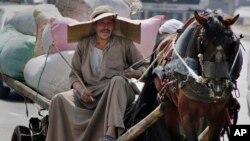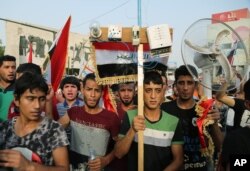More than 60 people have been killed in the past few days and hundreds of people have been hospitalized from a heat wave that has gripped the Middle East for weeks, according to Egyptian state news.
Some cities have been hit with what "feels like" temperatures of about 70 degrees Celsius.
This summer’s heat has killed many others across the region with temperatures that have been in the 40s and sometimes even the 50s for weeks.
The elderly, detainees and mental patients have been among victims in Egypt.
Heat divides rich, poor in Egypt
The heat wave has had other consequences, like further fracturing societies in the Middle East, according to Ziad Akl, a senior researcher at the Cairo-based Al-Ahram Center for Political and Strategic Studies.
“It is highlighting the huge gap that exists between classes in the region in general and specifically in countries that are not as rich as the Gulf countries. So in Egypt, for example, it is dividing the classes further,” he said.
He added that the wealthy in Egypt have either taken to the beaches or remain inside with air conditioners. And the poor try to cool off in places like public fountains, to the dismay of the rich.
The hot weather along with poor infrastructure and a regional security crisis is also driving out-of-the-ordinary practices. Some people are searching for religious coping mechanisms. Others are actually assigning blame for the weather, he said.
Among the more far-fetched local conspiracy theories is the idea that the government caused the harsh weather in order to increase oil output, he explained. “As ridiculous... as that sounds, I’ve seen people who believe in that,” he said.
Heat cuts power in Iraq
In Iraq, extreme temperatures are partially responsible for driving recent protests against government corruption that has resulted in days-long power cuts in the middle of the summer, according to Suadad al-Salhy, a freelance journalist who covers Iraq for Middle East Eye.
“Last week most Iraqi areas were left without electricity for almost three days,” she said. “People tend to use all the time their private generators, and this means raising the prices of gasoline.”
Thousands of people took to the streets in protest, she added, prompting the government to promise widespread reforms. But temperatures are once again on the rise and, like in Egypt, families in Iraq, especially among the roughly two million internally displaced people, face severe health consequences from the severe heat.
“Many children among the displaced families died because of the wave of heat,” said al-Salhy. “Many people suffered de-hydration.”






